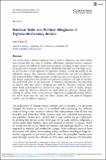Files in this item
National debt and political allegiance in eighteenth-century Britain
Item metadata
| dc.contributor.author | Weber, Lina | |
| dc.date.accessioned | 2022-02-18T17:30:02Z | |
| dc.date.available | 2022-02-18T17:30:02Z | |
| dc.date.issued | 2022-09-01 | |
| dc.identifier | 276786725 | |
| dc.identifier | 7d69e916-1488-493a-a853-310336745415 | |
| dc.identifier | 85123920541 | |
| dc.identifier | 000746723300001 | |
| dc.identifier.citation | Weber , L 2022 , ' National debt and political allegiance in eighteenth-century Britain ' , The Historical Journal , vol. 65 , no. 4 , pp. 1015-1034 . https://doi.org/10.1017/S0018246X21000832 | en |
| dc.identifier.issn | 0018-246X | |
| dc.identifier.other | RIS: urn:E3ACB3D09CD4F624DFC4611B480F0E1C | |
| dc.identifier.other | ORCID: /0000-0002-8397-3320/work/107287322 | |
| dc.identifier.other | RIS: urn:E3ACB3D09CD4F624DFC4611B480F0E1C | |
| dc.identifier.uri | https://hdl.handle.net/10023/24910 | |
| dc.description.abstract | The article traces a hitherto-neglected form of political obligation, one that resulted from national debt and relied on creditors’ self-interest. Eighteenth-century commentators argued that William III had introduced public borrowing to gain support from the people and to maintain the Revolution Settlement. This claim was first made by tories and became a staple argument of opposition authors. Around the middle of the eighteenth century, this connection between national debt and political allegiance was reassessed. Robert Wallace presented the debt as a price worth paying for the excellent British constitution, David Hume considered it as Britain's last hope to maintain the established order. In the discussions of American independence, the association of national debt with political obligation was used for divergent purposes. While Adam Smith and Richard Price utilized it to argue for a reform of empire, Thomas Paine urged the American provinces to unite under an American national debt. Drawing on authors from various political allegiances in eighteenth-century Britain, the article shows how the same idea about national debt and political obligation could be used for different purposes. | |
| dc.format.extent | 20 | |
| dc.format.extent | 482285 | |
| dc.language.iso | eng | |
| dc.relation.ispartof | The Historical Journal | en |
| dc.subject | DA Great Britain | en |
| dc.subject | HB Economic Theory | en |
| dc.subject | JN101 Great Britain | en |
| dc.subject | T-NDAS | en |
| dc.subject | MCC | en |
| dc.subject.lcc | DA | en |
| dc.subject.lcc | HB | en |
| dc.subject.lcc | JN101 | en |
| dc.title | National debt and political allegiance in eighteenth-century Britain | en |
| dc.type | Journal article | en |
| dc.contributor.institution | University of St Andrews. School of History | en |
| dc.identifier.doi | 10.1017/S0018246X21000832 | |
| dc.description.status | Peer reviewed | en |
This item appears in the following Collection(s)
Items in the St Andrews Research Repository are protected by copyright, with all rights reserved, unless otherwise indicated.

